Once associated with secret societies or gangs, tattoos in Singapore have shed their negative connotations over the years to become expressions of art and personality.
Hand-poked tattoos are the latest trend. During the pandemic of 1918, young people took advantage of the extra time to experiment at home with body tattoos.
The tattoos created this way are not made by a machine. Instead, the tattoo needle is dipped with ink and poked into the skin dot by dot.
Explaining her reasons for using this method, self-taught Singaporean tattoo artist Vanoha Chiam (@vanoha.ink) told The Straits Times that it is mainly due to “accessibility.”
Hand-poking practitioners do not have to purchase a tattoo machine that would cost several hundred dollars.
Ms. Chiam (27) was still studying at Nanyang Technological University in 2020 when she first began exploring tattooing.
YouTube and Reddit had all the information she needed. Supplies were readily available at a local store.
She did it in her own bedroom during her first two years of tattooing. Only last year, when she rented the studio, she moved out.
Ms. Mi-e, a 22-year-old home-based artist specializing in hand-poke art, began her tattooing journey on a similar note. After graduating from Nanyang Polytechnic in September of last year, she became interested.
“I watched many videos, bought a small hand-poking kit online, and started to take in clients willing to let me tattoo them,” she said.
Traditional artists claim that formal training is required
Self-taught tattoo artists are a controversial trend in the industry.
Mr. Lionel Ng, founder of Traditions Tattoo Collective in Arab Street (@lionelngtattoo), has worked in the tattoo industry since 1997.
He estimates that the number of tattoo studios – including home-based ones – had shot up from around four when he joined the industry to well over a thousand. ST is told that no official numbers are available.
“Today, with the Internet, everything is free. Pinterest (a social network that allows users to share images) is the source of most art people copy. There is a death of originality,” he lamented.
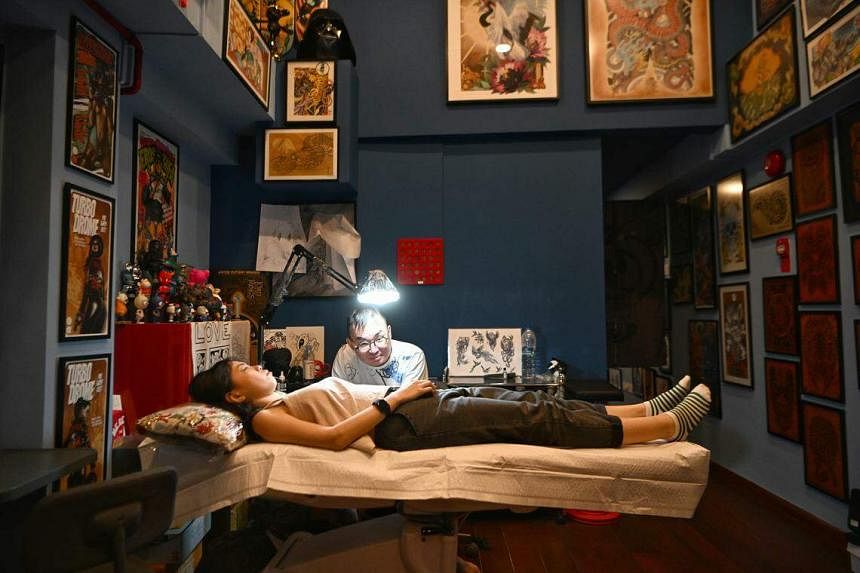
Apprenticeships are the traditional way for those who want to enter the industry. This period can last from one to three years when they learn all the skills necessary to tattoo their clients.
Ms. Valerie Chio (@r2binksThe 31-year-old took the traditional route six years earlier. She was employed full-time by an architectural firm but felt drawn to the industry.
She agreed with the firm she works for, which allows her to balance being a tattoo apprentice with her architecture job.
Ms. Chio said: “I would leave the office at 2 pm and rush to the studio every weekday, and also be at the tattoo shop every weekend.”
After three years in the apprenticeship, she only became a full-time tattoo artist in 2019. She said it was hard to do two jobs simultaneously, but the process helped her build a solid foundation for her current career.
“When I was an apprentice, I learned about cleanliness and basic shop-keeping, and it also helped that my mentor was always there to guide me,” said Ms. Chio, who is now with Tooth and Nail Tattoo studio in Kandahar Street.
“I don’t think I’d be able to reach where I am today if I didn’t go through my apprenticeship.”
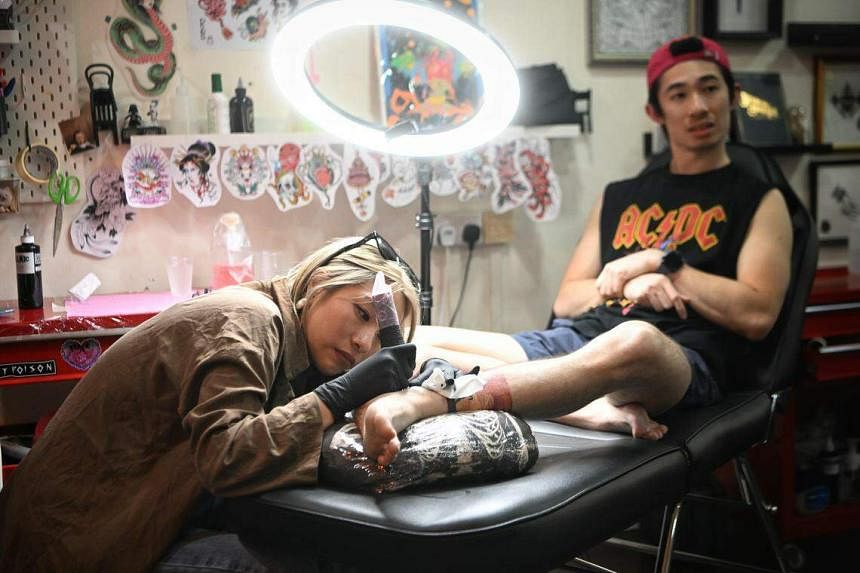
Traditional tattooists claim that being an apprentice helps them to learn more than just technical skills. They also say it allows them to ensure everything is done precisely.
Mr. Ng said: “Sometimes, I see videos on TikTok of these home artists showing off the tattoos they’ve made… They don’t know what they’re doing. The technique is incorrect.
“Look at the number of home artists there are in Singapore now. How clean do they keep themselves? Do they know anything about cross-contamination?”
He said he spent between $2,000 and $3,000 monthly on medical equipment, bed linens, and other items to keep his studio clean.
However, some hand-pokers disagree.
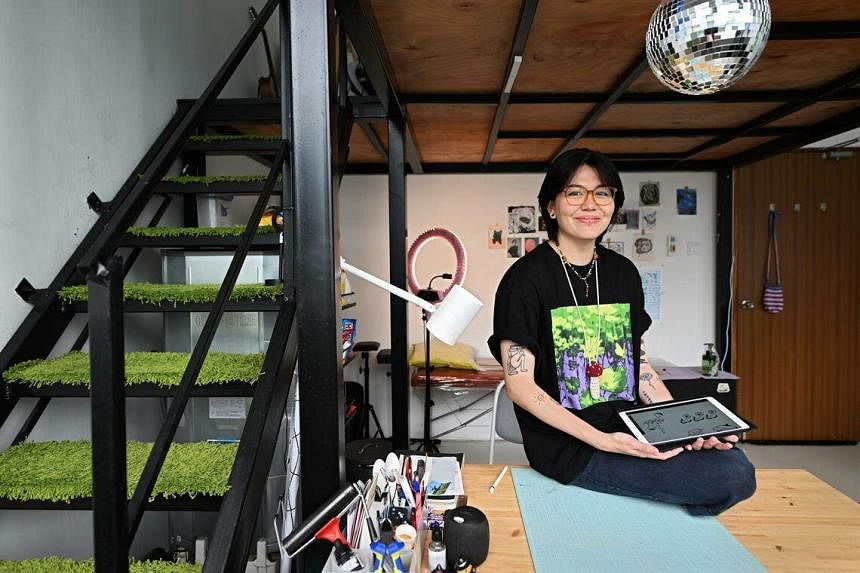
Ms. Mie watches videos online about tattoo aftercare, sanitation, and equipment handling. “It helps that I used to study food science, so hygiene is essential to me… I haven’t caused an infection, so my hygiene practices are fine.”
Ms. Chiam stated that infection concerns are valid since self-taught and home-based artists typically operate independently. “It’s really up to our due diligence to make sure whatever we do is proper and clean. I can only say that because I’m on my own, I do much more to ensure everything here (in my studio) is clean.”
Health risks
Dr. Heng Jun Khee is a consultant with the National Skin Centre and told ST that bacteria-infected ink could lead to further complications.
Said Dr. Heng: “Amateur tattooists who perform home tattoos may not have proper infection prevention and control training… (This) may carry a greater risk of contracting skin infections.”
From keloid scars to neurosensory reactions, complications are possible. The ink in tattoos can cause a persistent itch.
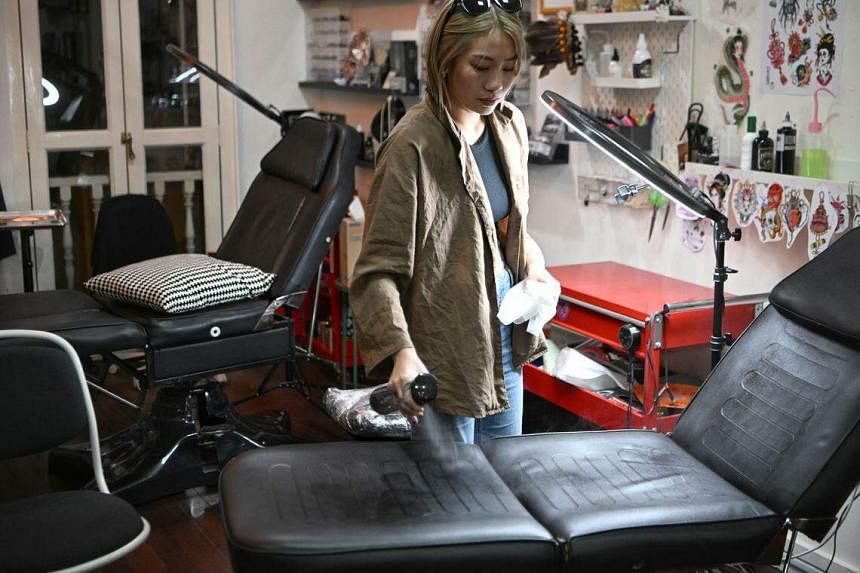
She said tattoos could cause serious health problems, including hepatitis B and C.
Dr. Christopher Foo, a dermatology specialist and consultant at Raffles Skin & Aesthetics Centre, said a common reaction is allergic contact dermatitis.
“This usually presents with an itchy rash and even blistering that requires treatment with cortisone creams or oral steroids if it is more severe,” he said.
Both doctors said tattoo artists’ experience, training, hygiene precautions, and equipment could help mitigate these complications.
It was also suggested that anyone looking to get tattooed do their research before choosing a tattoo studio.
Industry Overview
In response to questions from ST, the Ministry of Home Affairs, I was told that it does not currently plan to regulate the tattoo business.
“There have not been any reported local cases of notifiable infectious disease linked to tattooing in the last few years,” it said.
“People may tattoo themselves for reasons such as beauty and fashion. While others may do so to show their affiliation to criminal gangs, others may choose to tattoo themselves for beauty and fashion, and police have not observed any evidence to suggest the link between body tattoos and crime.”
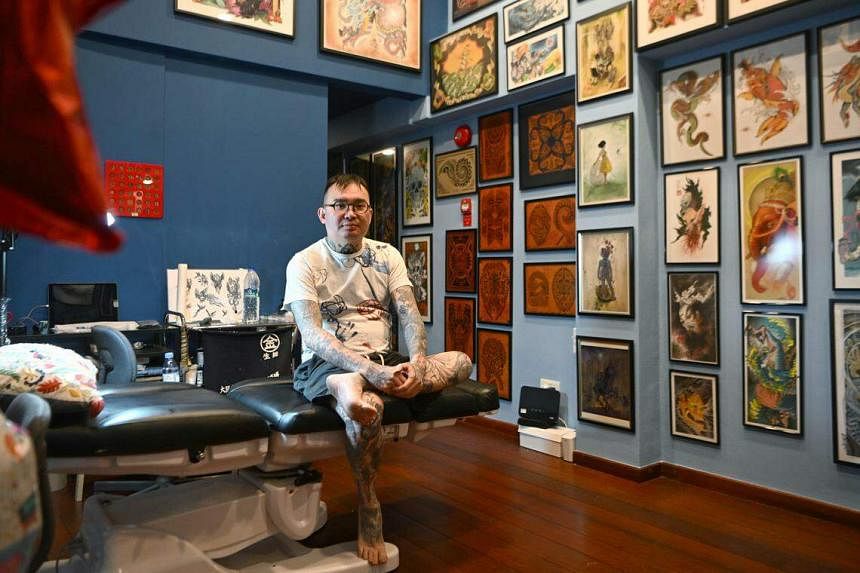
But Traditions Tattoo’s Mr. Ng wants more industry oversight, even if some studios and artists could go out of business.
“I know that regulating the industry might hurt some people’s livelihoods. Maybe tattoos won’t be so accessible anymore. But this also means that only the ‘proper’ artists are left on the scene,” he said.
He is now offering classes to those interested in art in his studio.
Many young people, like Ms. Chiam, are determined to take a different route in the industry.
“I’m very aware that I’m not trying to be a (traditional) tattoo artist. I have full respect for those who have gone through an apprenticeship, and I’d never try to pretend to be like them,” she said.
“I think we are serving completely different needs.”
Comment on and share this article
